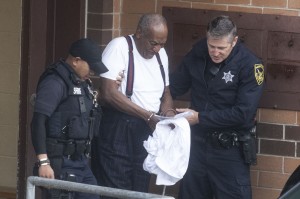Bill Cosby has spent his first  24 hours behind bars. You can’t help but wonder what that must have been like.
24 hours behind bars. You can’t help but wonder what that must have been like.
When did it become real for him? Was it when he heard the sentence, or shortly thereafter, when he was first shackled? If neither of those, it was surely sometime last evening or last night, when he was directed into some small, confining space, and the door was locked behind him. That might have been the first time, maybe for weeks or months or years, that he was finally alone with this thoughts. How did he cope with that?
By now he’s surely interacted with other inmates—is his celebrity or his age, or his crimes, impacting the way they treat him? By now he’s had a few jailhouse meals—did anyone suffer upon him the thousand different Jell-O jokes that occasion was begging for?
Most importantly, what are his regrets? Last night he laid down on a cot smaller and far less luxurious than anything he’s experienced in decades. He did not sleep. I wasn’t there and I haven’t heard anything you haven’t, but this I’m sure of: He did not sleep. So what went through his mind? Was he regretting his pattern of predation, the unspeakable things he’s done to women for decades? Or was he regretting just that one he was convicted for? Was he regretting only that he got caught?
There’s something pitiable, in the abstract, about an infirm old man falling so far and landing in a place that he’ll in all likelihood spend his remaining days. But knowing what we know about Bill Cosby, we know he deserves no pity. It’s just a pity his crimes went unchecked for so long. And it’s a pity that for so long, we were so wrong about what kind of man he was.
Because in a lot of ways, the evolution of Cosby marched alongside the evolution of a few very different generations. My parents saw his groundbreaking mid-’60s role in I Spy. I was raised first on the ’70s strangeness of Fat Albert, then on that camouflaged wholesomeness of the Huxtable household. For my daughter, back in the aughts, it was Little Bill. All of us saw these disparate faces of Cosby, then all of us together saw the mask ripped off, and the ugliness beneath.
In that way Bill Cosby is again, for one last time, a Man For His Times…because these are the days of scouring away the veneer and of revealing the underlying rot. We’re finding a lot of rot, we’re finding it every-damned-where we look, but we have to do this. It’s going to take a while longer yet, and some of these stains we find will be more resistant than others. But it must be done.
There’s some fashionability, if that’s the right word, to say that #MeToo must carry on in the names of and on behalf of all our mothers, sisters, daughters, wives. And while that’s not incorrect, exactly, I think it’s needlessly reductive. #MeToo isn’t a movement to benefit women. It’s a movement to benefit us. All of society suffers the malfeasance of people like Cosby. All of society is bettered when people like Cosby are put away.
At this moment—the moment I’m writing this and the moment you’re reading it—chances are very good that Bill Cosby is still ruminating over how high he soared and how low he fell. He’s probably wallowing in regret, although once again we can’t be sure how honest those regrets might be. But that doesn’t matter.
In the end it doesn’t matter if Cosby sees the light or goes to his grave feeling sorry only for himself. His fall serves a much higher purpose. Years from now or maybe tomorrow or maybe in an hour, someone will think of doing something despicable, and when they think about Bill Cosby, maybe they’ll think twice.
Multiply that by a thousand Bill Cosbys, and by the untold years ahead of incremental #MeToo progress. The result is that the society we need and deserve is coming—not at all quickly enough, but it’s coming.